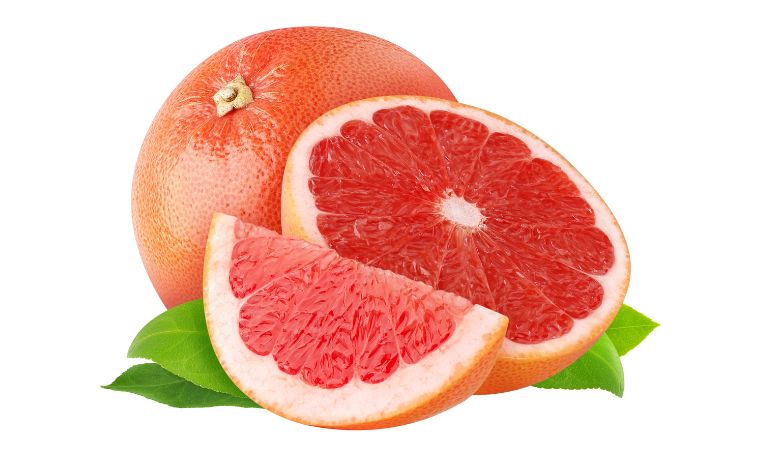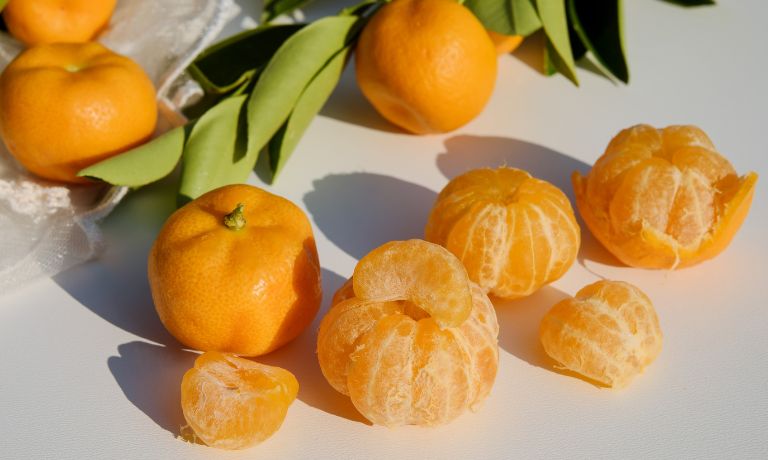If you’re a fan of the vibrant flavor of blood orange, you might be surprised to learn that plenty of other excellent options are available to substitute for blood orange when yours get used up!
Whether you’re looking to bake something special or simply switch up your regular citrus routine, there is no shortage of fresh and dried substitute fruits that can lend an equally zesty kick with unique tastes and textures.
So let’s explore some extraordinary alternatives to blood oranges today.
What Is Blood Orange?
Blood Orange is an orange-red citrus fruit known for its sweet flavor and juicy texture.
It is a cross between the standard orange and the bitter Seville or sour orange, resulting in larger fruit with more intense color and flavor than regular oranges.
Blood Oranges are used in cooking and drinking to add a unique citrus flavor to many dishes.
They can be added to various salads, desserts, and drinks.
Blood Oranges are also popularly used in cocktails and mocktails for their unique flavor profile.
Their juice can also be used to make delicious marmalades and jellies.
In addition to its culinary uses, the pulp of the fruit has many health benefits, such as being rich in Vitamin C and containing antioxidants.

Substitutes For Blood Orange
If you don’t have blood orange juice on hand, several alternative options for you are available.
Cara Cara Oranges
Cara Cara oranges are a type of navel orange.
They have a distinctive bright pink flesh, which is sweeter and less acidic than the standard navel.
The flavor of the Cara Cara is often described as reminiscent of raspberries and blackberries with an underlying hint of citrus sweetness.
In cocktails, the Cara Cara adds a unique flavor and color to drinks.
It can be muddled in margaritas or blended into smoothies for a fun twist on the classic orange juice beverage.
The fruit also makes an excellent addition when baking recipes that call for orange zest, adding a slightly sweeter flavor and a unique pink hue.
Cara Cara oranges are also a great source of dietary fiber, Vitamin A, B-complex vitamins, Vitamin C and minerals like potassium.

Valencia Oranges
Valencia oranges are a type of sweet orange from the citrus family.
They have a thin, smooth rind and juicy flesh, making them popular for juicing.
Valencia oranges typically have fewer seeds than other varieties of oranges. They offer similar sweetness and tartness as blood oranges.
They are also high in vitamin C, potassium, dietary fiber, and other essential vitamins and minerals.
Although not as brightly colored as blood oranges, Valencia oranges can provide a unique twist when used in recipes or drinks that call for a citrus flavor.
For example, you can mix the juice of Valencia oranges with other juices to create a more complex flavor profile.
You can also use the zest or juice of Valencia oranges to add sweetness to savory dishes.
The rind can also be candied as a sweet garnish on cakes and ice cream.

Navel Oranges
Navel oranges are a type of sweet orange that are most commonly available throughout the year.
They have a thick skin, deep red-orange color, and are typically seedless.
The name “navel” comes from the small textured section at the top of the fruit, which looks like an outie belly button!
They offer similar sweetness and citrusy notes but don’t have the deep red-purple hue of blood oranges.
In juice or cocktails, navel oranges can provide the same flavor and texture as a blood orange with less colorful visual impact.
Navel oranges are more widely available than blood oranges.
They are also a good choice when blood oranges aren’t in season, or you don’t have access to fresh ones.
Plus, they tend to be less expensive than their vibrant counterparts.

Pink Grapefruit
Pink grapefruit is a tart citrus fruit that offers a sweet-sour flavor.
It has many of the same characteristics as blood orange, but its color is pinker and not quite as juicy.
Regarding taste, pink grapefruit can be substituted in recipes for blood oranges because it adds a nice pop of tartness and sweetness.
In drinks, pink grapefruit can be used as a garnish or ingredient to add flavor without changing the drink drastically.
It is also a great way to brighten up dishes with its vibrant color.
When using pink grapefruit in recipes that call for blood oranges, adjust the amount of sugar accordingly, as pink grapefruit isn’t as sweet.
Note that pink grapefruit is more acidic than blood oranges, so extra citrus juices may need to be added when substituting.

Tangerines
Tangerines, also known as mandarins or Mandarin oranges, are small citrus fruit closely related to the orange.
Tangerines have a sweet flavor and an attractive, bright orange color.
They have slightly thinner skin than oranges, making them easier to peel and segment.
Due to their smaller size and sweeter taste, tangerines are popular for snacking and in recipes.
Tangerines have a lower acidity than blood oranges, making them great for salads and other dishes that need sweetness rather than tartness.
They can also be used as an easy sweetener or flavoring agent in cocktails and drinks.
Additionally, their bright orange color makes them an attractive addition to recipes.
The bright hue looks especially vibrant when used in fresh fruit salads or smoothies.

Cranberry Juice
Cranberry juice is a tart and slightly sweet beverage made from the juices of cranberries.
Cranberry juice can make a good substitute for blood orange in both cooking and drinking.
Its tartness adds complexity to savory dishes, and its sweetness can help balance out intense flavors.
It also has a natural color that can add visual appeal to recipes.
Additionally, it can be sipped neat or blended into smoothies for a nutritious breakfast or snack.

FAQs
Can I Substitute A Regular Orange For The Blood Orange?
Yes, you can substitute a regular orange for the blood orange in this recipe.
Be aware that the flavor and texture will differ slightly from what is described in the recipe, but it should still work well.
You can also use other citrus fruits like lemon or lime instead of an orange for a unique flavor profile.
What Citrus Fruit Is Most Similar To Blood Oranges?
The closest citrus fruit to a blood orange is likely the Moro variety of blood oranges.
The Moro variety has a similar flavor profile and color as the original variety.
It also has an intense, sweet-tart flavor that many people enjoy.
What Flavor Comes Closest To That Of A Blood Orange?
The closest flavor to a blood orange would be a mix of sweet and tart, with hints of raspberry and cherry.
Other popular varieties with similar flavors include Cara Cara oranges, tangerines, and clementines.
Each of these has its unique flavor profile, but overall they come close to the taste of blood orange.
Conclusion
As you can see, there are many options to substitute for blood orange in cooking and drinking.
From Valencia oranges to navel oranges to pink grapefruit to tangerines, cranberry juice, and even grapefruit juice, the options are plentiful!
Each one offers a unique flavor and look that can be used as an alternative to blood oranges.
With these substitutes, you can continue to enjoy the flavor and color of blood oranges throughout the year.

